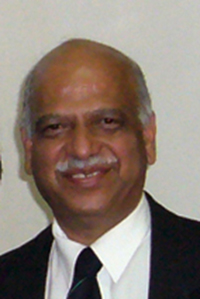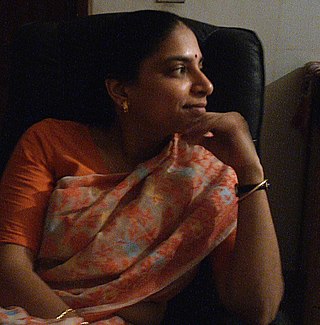Related Research Articles

Narayansami Sathyamurthy is a chemist in India. He is the founding director of the Indian Institute of Science Education and Research (IISER), Mohali, Punjab, India and the President of Chemical Research Society of India.

Shridhar Ramachandra Gadre is an Indian scientist working in computational quantum and theoretical chemistry.

Bikash Sinha was an Indian physicist who was active in the fields of nuclear physics and high energy physics. Sinha was the director of the Saha Institute of Nuclear Physics and Variable Energy Cyclotron Centre and the chairman of the Board of Governors of the National Institute of Technology, Durgapur in June 2005. He was also a member of scientific advisory board to the Prime Minister of India.

Kapil Hari Paranjape is an Indian mathematician specializing in algebraic geometry. He is a Professor of Mathematics at the Indian Institute of Science Education and Research, Mohali.
Somdatta Sinha is an Indian researcher and professor of biology, who is one of the earliest to start working in the area of theoretical biology in India. Her expertise is in the interdisciplinary fields of mathematical & computational biology, nonlinear dynamics and complex systems with a view to understand the logic and design of biological processes. She studies spatio-temporal organization in biological systems – from biological sequences to spread of disease in populations – using mathematical and computational methods. She has played a central role in the development of mathematical and computational biology in her country through research, organization of scientific meetings, training programs, conferences, and teaching interdisciplinary courses at the undergraduate and postgraduate levels. Her research encompasses patterns, interactions, and dynamics of biological systems using mathematical and physical methods to understand complex multi-scale biological systems. Sinha's research contributions focus on modelling a variety of biological systems, such as, circadian rhythms, pattern formation, biochemical pathways, synthetic biology, single and meta-population ecological models, epidemiology, and controlling spatiotemporal dynamics. She has also carried out computational analysis of genomes for classification of organisms using Chaos Game Representation (CGR) and Multi-fractal analysis, protein structure function analysis using graph theory, and network analysis of large biochemical pathways. Her publications have made important contributions in the respective fields and are highly cited. Her seminal contribution to the development of the interdisciplinary field of Mathematical and Computational Biology in India was acknowledged by the Department of Biotechnology, Govt of India with the National Senior Woman Bioscientist Award in 2013 and the J C Bose National Fellowship from the Department of Science and Technology, Govt. of India. She is a fellow of the Indian National Science Academy, Indian Academy of Sciences and National Academy of Sciences. She was elected Fellow of the Wissenschaftskolleg zu Berlin for 2000-2001 and International Visiting Research Scholar at the Peter Wall Institute for Advanced Studies at the University of British Columbia, Vancouver, Canada in 2018. She has traveled widely across the globe and has given many invitational talks in universities and conferences.

Charusita Chakravarty was an Indian academic and scientist. She was a professor of chemistry at the Indian Institute of Technology, Delhi since 1999. In 2009 she was conferred Shanti Swarup Bhatnagar Prize for Science and Technology in the field of chemical science. In 1999, she received B.M. Birla Science Award. She was an Associate Member of the Centre for Computational Material Science, Jawaharlal Nehru Centre for Advanced Scientific Research, Bangalore.
Dipankar Das Sarma, popularly known as D.D. Sarma, is an Indian scientist and structural chemist, known for his researches in the fields of Solid State Chemistry, Spectroscopy, Condensed Matter Physics, Materials Science, and Nanoscience. He is a former MLS Chair Professor of Physics and Chairman of the Centre for Advanced Materials and the GAST Professor of Uppsala University, Sweden, A recipient of TWAS Physics Prize and the UNESCO Biennial Javed Husain Prize, Sarma was honored by the Council for Scientific and Industrial Research (CSIR), Government of India, in 1994, with the Shanti Swarup Bhatnagar Prize for Science and Technology.
Suryanarayanasastry Ramasesha is an Indian quantum chemist and a former Dean of the Faculty of Science at the Indian Institute of Science. He is a former chair of the Solid State and Structural Chemistry Unit and Amrut Modi Chair professor of Chemical Sciences at IISc. He is known for his studies on conjugated organic systems and low-dimensional solids and is an elected fellow of the Indian National Science Academy, the Indian Academy of Sciences and The World Academy of Sciences. The Council of Scientific and Industrial Research, the apex agency of the Government of India for scientific research, awarded him the Shanti Swarup Bhatnagar Prize for Science and Technology, one of the highest Indian science awards, in 1992, for his contributions to chemical sciences.
Amalendu Chandra is an Indian theoretical physical chemist, a professor and the head of the Department of Chemistry at the Indian Institute of Technology, Kanpur. He is known for his microscopic theories and simulations on liquids, interface and clusters. He is an elected fellow of the Indian Academy of Sciences and the Indian National Science Academy. The Council of Scientific and Industrial Research, the apex agency of the Government of India for scientific research, awarded him the Shanti Swarup Bhatnagar Prize for Science and Technology, one of the highest Indian science awards, in 2007, for his contributions to chemical sciences.
Sampat Kumar Tandon is an Indian geologist and a professor emeritus of geology at the University of Delhi. He is a former pro-vice chancellor of Delhi University, Sir J. C. Bose Chair Professor of the department of Earth and Environmental Sciences at the Indian Institute of Science Education and Research, Bhopal and a D. N. Wadia Chair Professor of the department of Earth Sciences at the Indian Institute of Technology, Kanpur.
Narendra Kumar was an Indian theoretical physicist and a Homi Bhaba Distinguished Professor of the Department of Atomic Energy at Raman Research Institute. He was also an honorary professor at Jawaharlal Nehru Centre for Advanced Scientific Research.
Muthusamy Lakshmanan is an Indian theoretical physicist currently working as Professor of Eminence at the Department of Nonlinear Dynamics of Bharathidasan University. Presently he is the DST-SERB National Science Chair awarded by the Science and Engineering Research Board, Department of Science and Technology. He has held several research fellowships which included Raja Ramanna fellowship of the Department of Atomic Energy, Alexander von Humboldt fellowship, Japan Society for the Promotion of Science fellowship, Royal Society Nuffield Foundation fellowship, and NASI-Senior Scientist Platinum Jubilee Fellowship. On 15 August 2021, he was conferred with the Dr. A. P. J Abdul Kalam Award by the Government of Tamil Nadu.
Deepak Dhar is an Indian theoretical physicist known for his research on statistical physics and stochastic processes. In 2022, he became the first Indian to be awarded the Boltzmann Medal, the highest recognition in statistical physics awarded once every three years by IUPAP, for exceptional contributions to the subject.
Arup Kumar Raychaudhuri is an Indian condensed matter physicist, materials scientist and a Distinguished Emeritus Professor at the S. N. Bose National Centre for Basic Sciences. Known for his pioneering work on the interplay of disorder and interaction, Raychaudhuri is an elected fellow of all the three major Indian science academies viz. Indian Academy of Sciences, National Academy of Sciences, India and Indian National Science Academy as well as the Asia-Pacific Academy of Materials. He is a recipient of a number of awards such as Millennium Medal of the Indian Science Congress, ICS Gold Medal of the Materials Research Society of India and FICCI Award. The Council of Scientific and Industrial Research, the apex agency of the Government of India for scientific research, awarded him the Shanti Swarup Bhatnagar Prize for Science and Technology, one of the highest Indian science awards, for his contributions to physical sciences in 1994.
Arun Mallojirao Jayannavar was an Indian condensed matter physicist and a senior professor at the Institute of Physics, Bhubaneswar. Known for his research on many interdisciplinary areas of condensed matter physics, Jayannavar was an elected fellow of all the three major Indian science academies viz. Indian Academy of Sciences, National Academy of Sciences, India and Indian National Science Academy. The Council of Scientific and Industrial Research, the apex agency of the government of India for scientific research, awarded Jayannavar the Shanti Swarup Bhatnagar Prize for Science and Technology, one of the highest Indian science awards, for his contributions to physical sciences in 1998.
Gattamraju Ravindra Kumar is an Indian laser physicist and a senior professor of Nuclear and Atomic Physics at Tata Institute of Fundamental Research. Known for his research on Ultrashort pulse and Warm dense matter, Kumar is an elected fellow of the Indian Academy of Sciences and the Indian National Science Academy. The Council of Scientific and Industrial Research, the apex agency of the Government of India for scientific research, awarded him the Shanti Swarup Bhatnagar Prize for Science and Technology, one of the highest Indian science awards, for his contributions to physical sciences in 2003. He is also a recipient of the B. M. Birla Science Prize and Infosys Prize.
Sanjay Puri is an Indian statistical physicist and a senior professor at the School of Physical Sciences of Jawaharlal Nehru University. Known for his research on non-linear dynamics, Puri is an elected fellow of the Indian Academy of Sciences and the Indian National Science Academy. The Council of Scientific and Industrial Research, the apex agency of the Government of India for scientific research, awarded him the Shanti Swarup Bhatnagar Prize for Science and Technology, one of the highest Indian science awards, for his contributions to physical sciences in 2006.
Amita Das is an Indian plasma physicist. She is currently a professor at the Indian Institute of Technology Delhi. Her research interests are in laser-plasma interactions, nonlinear plasmas, plasma turbulence and the properties of strongly coupled and dusty plasma systems.

Govindan Rangarajan, is an Indian mathematician, academician, and a professor. He is currently serving as the Director of the Indian Institute of Science (IISc) at Bangalore, India and as a professor in the Department of Mathematics at the same.

Sujith Raman Pillai Indusekharan Nair is an Institute Professor and the D. Srinivasan Chair Professor in the Department of Aerospace Engineering at the Indian Institute of Technology Madras. In 2023, he was inducted as International Member of the United States National Academy of Engineering. He was selected as a Fellow of the Combustion Institute in 2022, and was awarded the Distinguished Fellowship of the International Institute of Acoustics and Vibration in 2021. He received the J. C. Bose Fellowship in 2019 and the Swarnajayanti Fellowship in 2005 from the Department of Science and Technology of the Government of India. He is a Fellow of the Indian Academy of Sciences, an Associate Fellow of the American Institute of Aeronautics and Astronautics, a Fellow of the Indian National Academy of Engineering, and an Honorary Fellow of the Indian Society of Systems for Science and Engineering (ISSE). He has been awarded Hans Fischer Senior Fellowship from the TUM Institute for Advanced Study in 2010. He was awarded Alexander von Humboldt Fellowship in 2000. He was the editor-in-chief of the International Journal of Spray and Combustion Dynamics from 2009 to 2015. He is currently a member of the editorial advisory board member of Chaos: An Interdisciplinary Journal of Nonlinear Science.
References
- ↑ "IAS - Women in Science" . Retrieved 6 April 2014.
- ↑ "Chaologix".
- ↑ "Notable Alumni of IIT Kanpur".
- ↑ "Curriculum Vitae".
- ↑ "Faculty listing".
- ↑ "Publications".
- ↑ "Chaos: An Interdisciplinary Journal of Nonlinear Science".
- ↑ "Communications in Nonlinear Science and Numerical Simulation".
- ↑ "Pramana - Journal of Physics".
- ↑ "Indian Journal of Physics".
- ↑ "Fellowship of The World Academy of Sciences (TWAS)".
- ↑ "J C Bose National Fellowship".
- ↑ "Fellowship of Indian National Science Academy".
- ↑ "Fellowship of Indian Academy of Sciences".
- ↑ "Birla Prize".